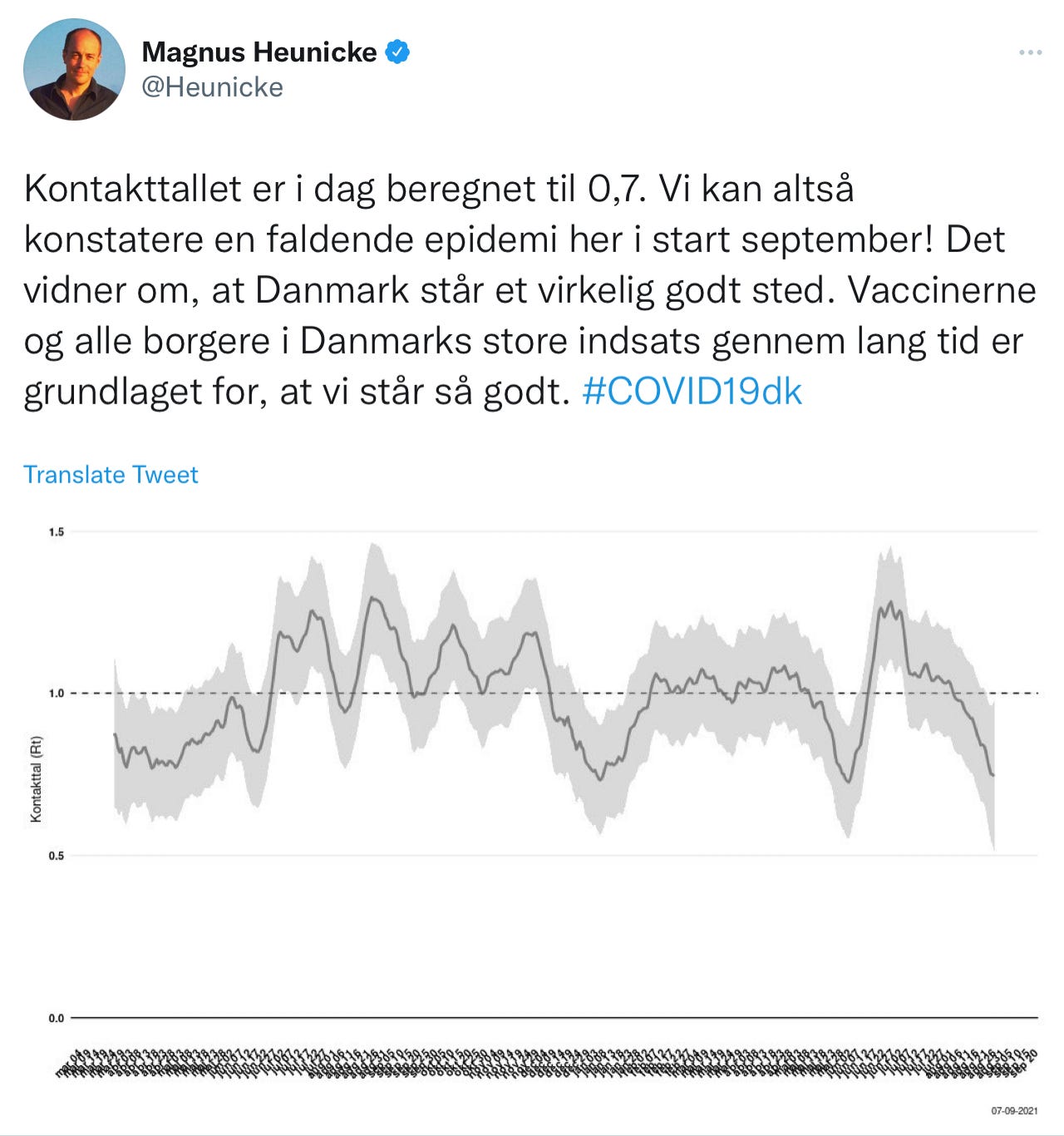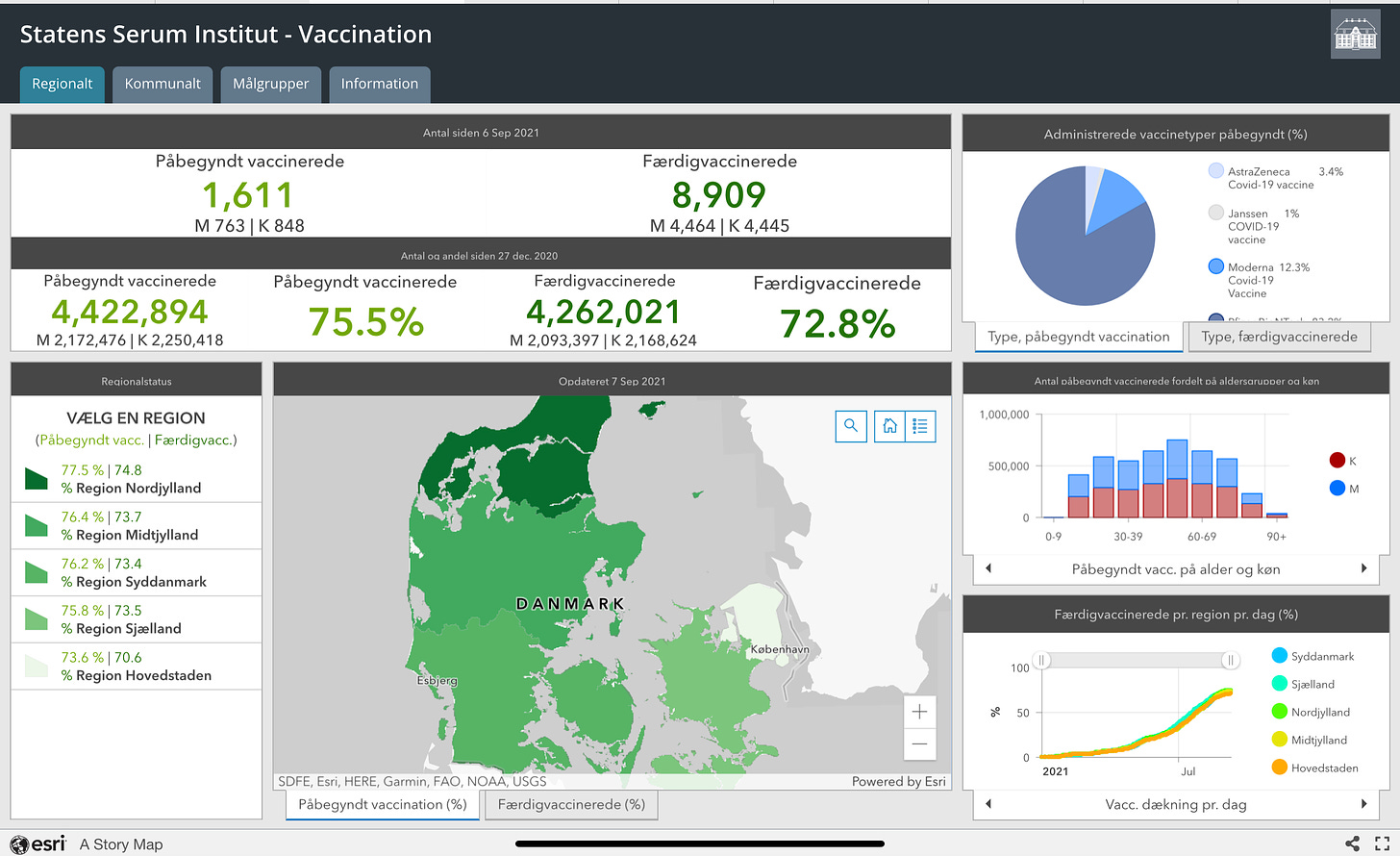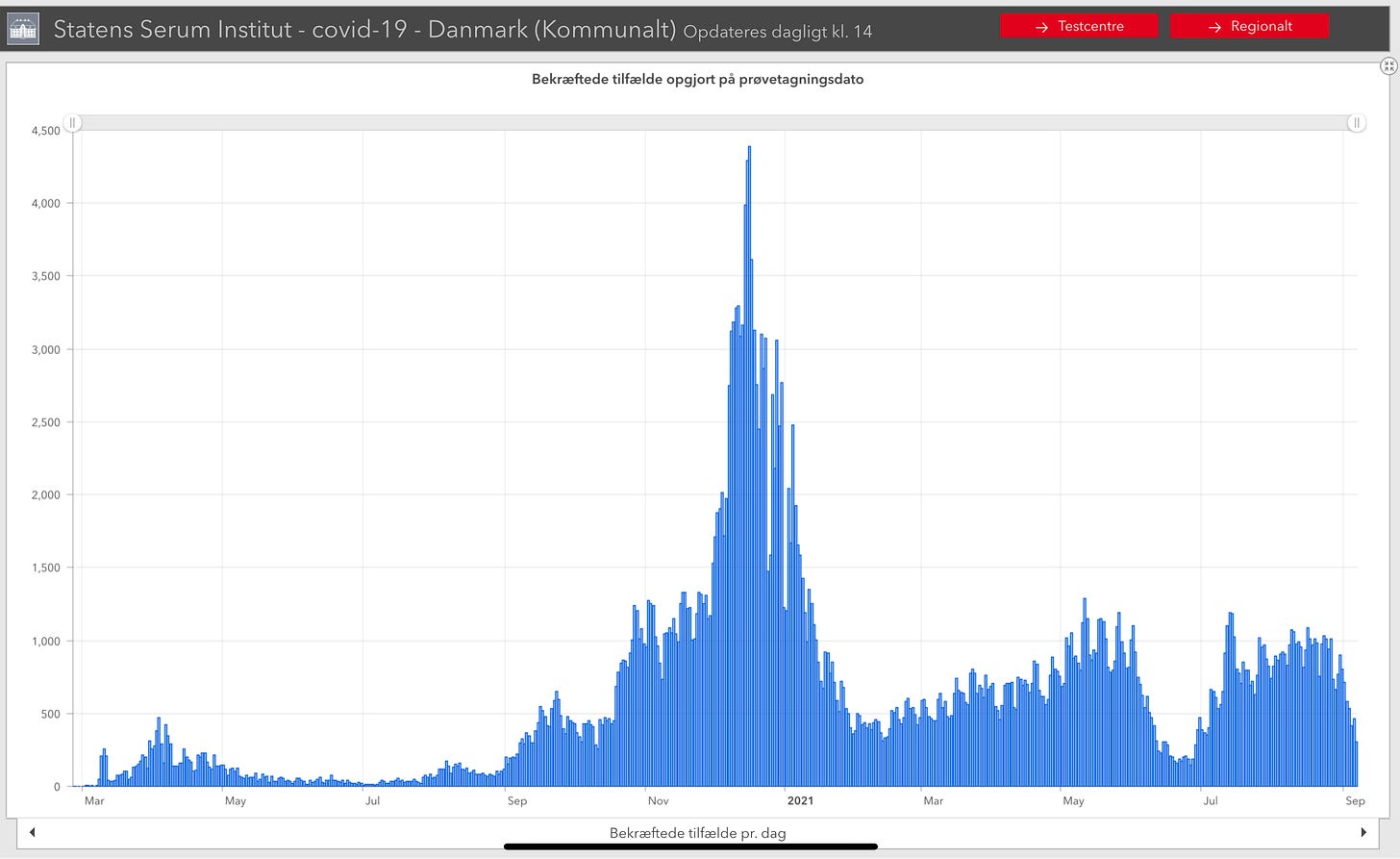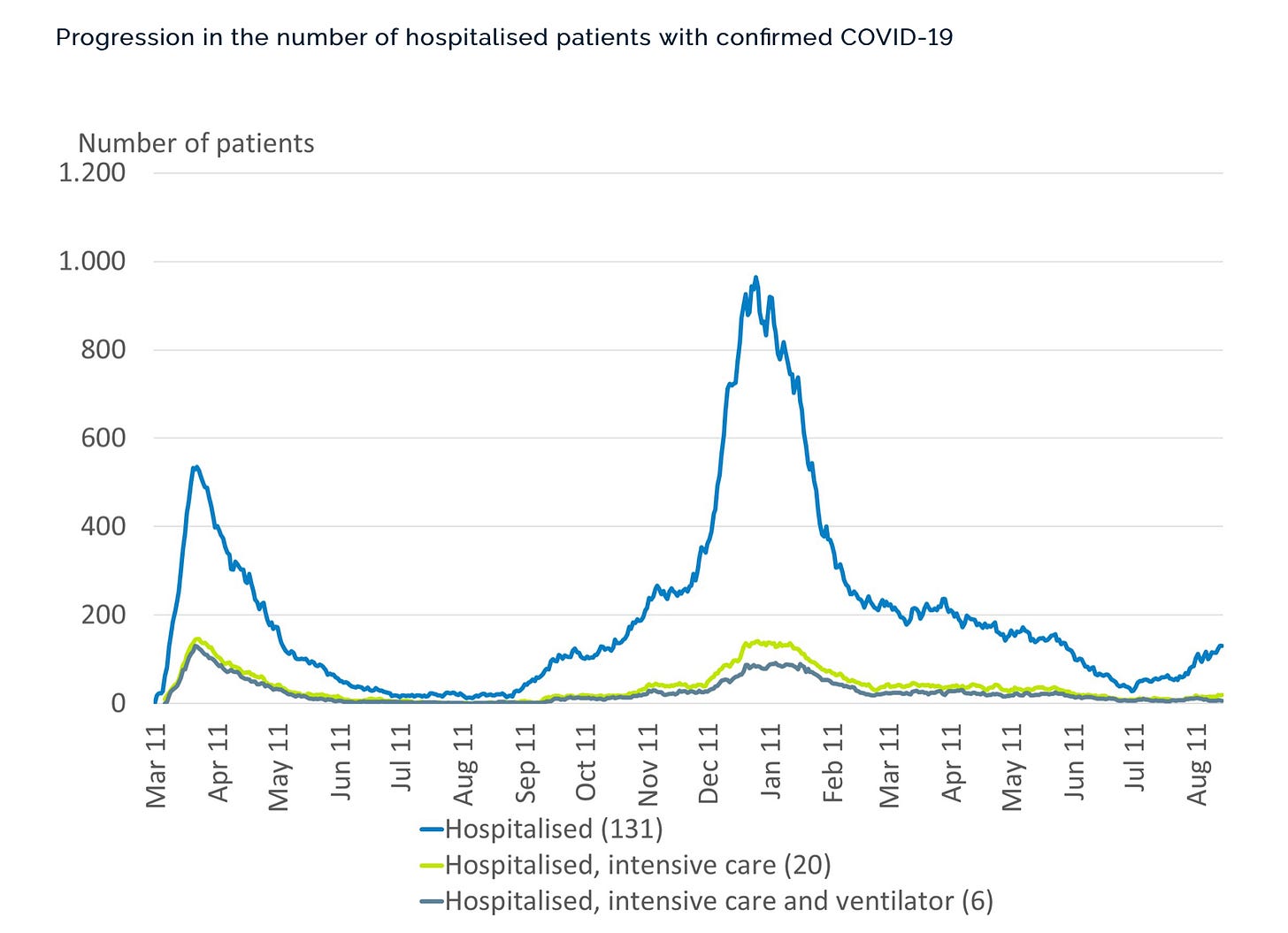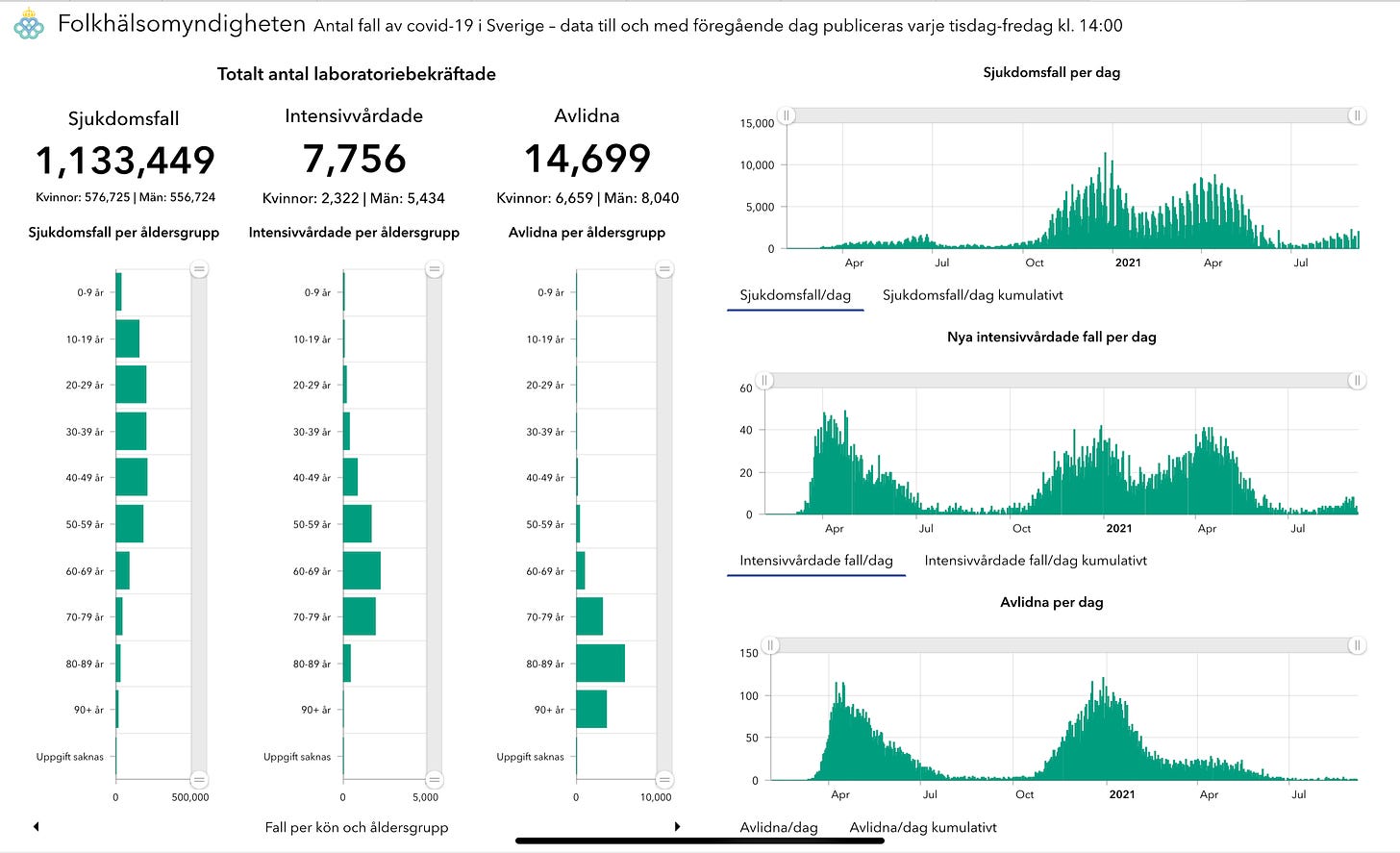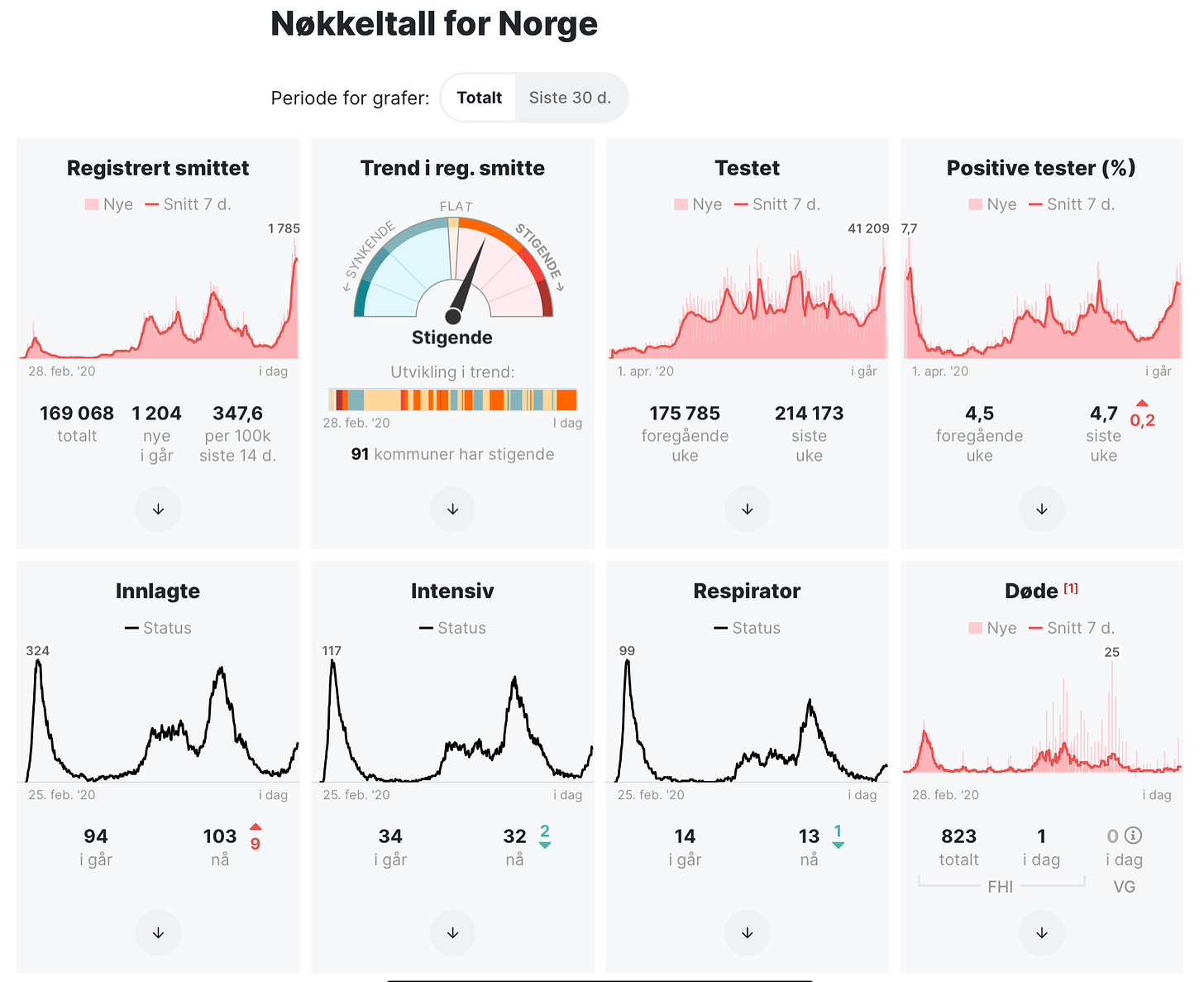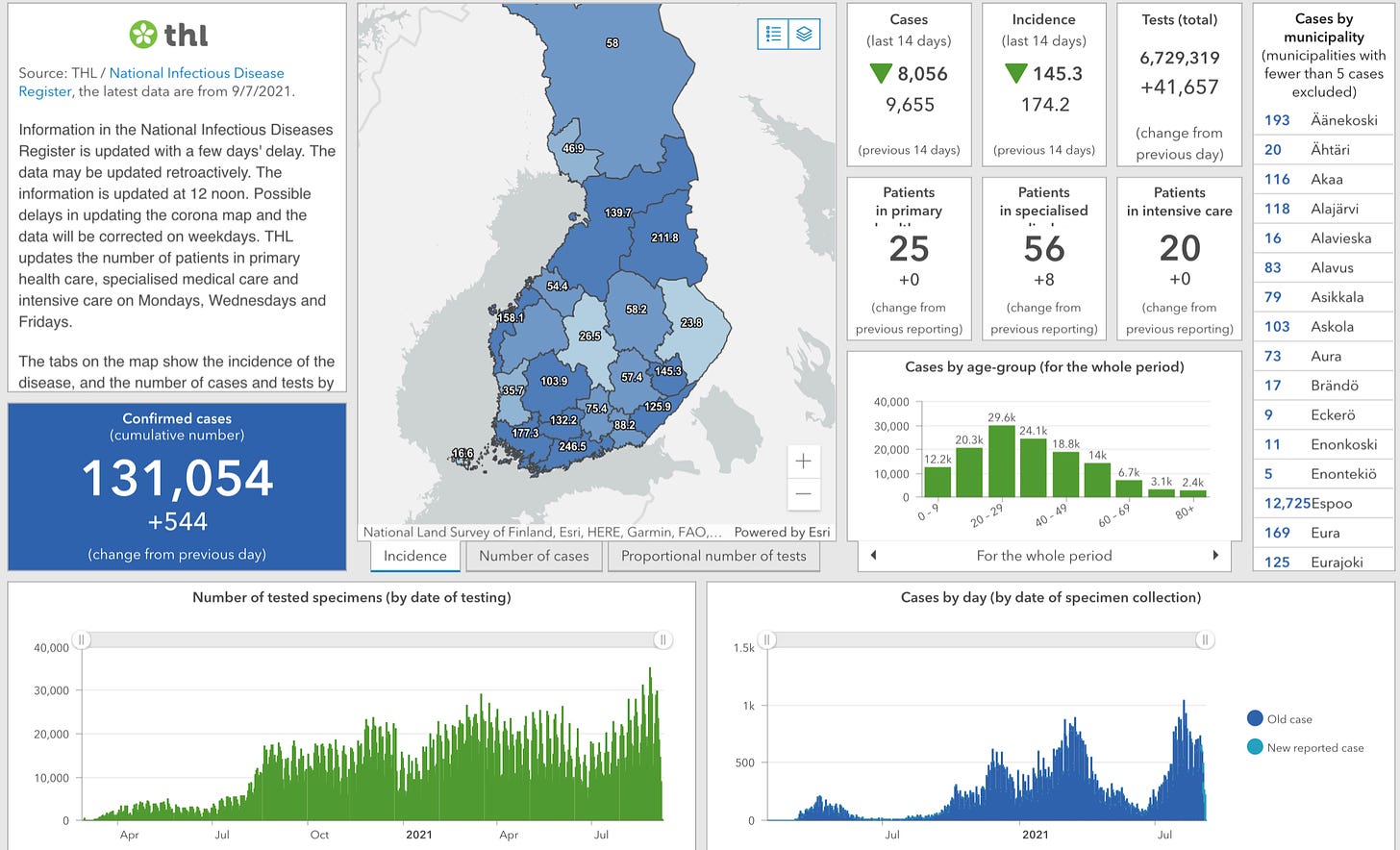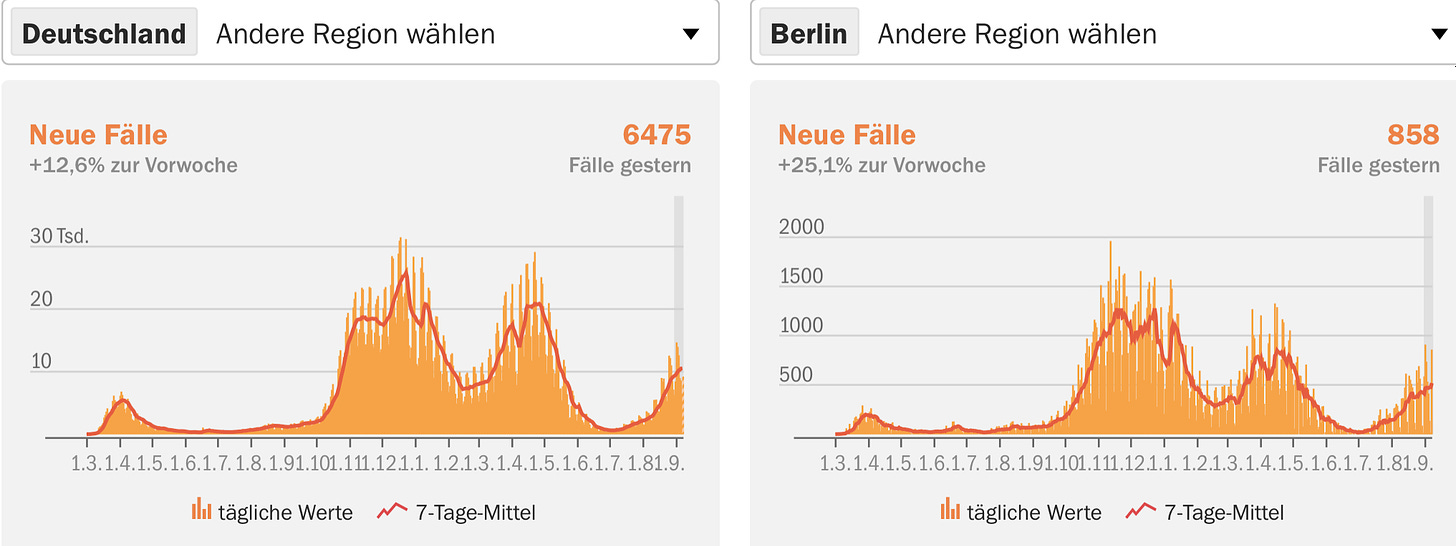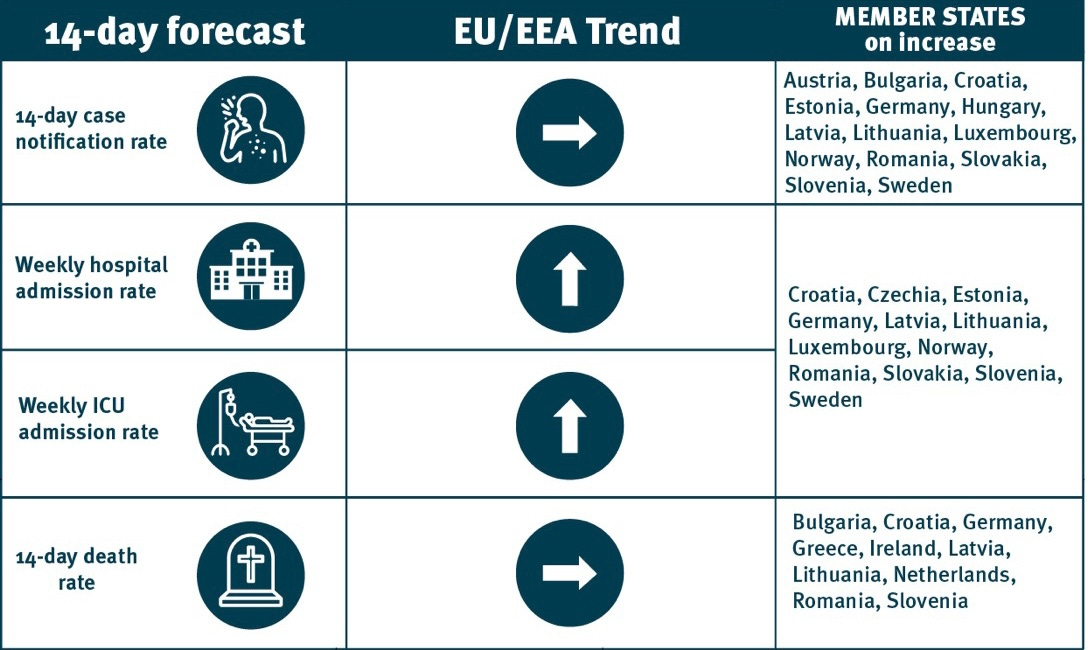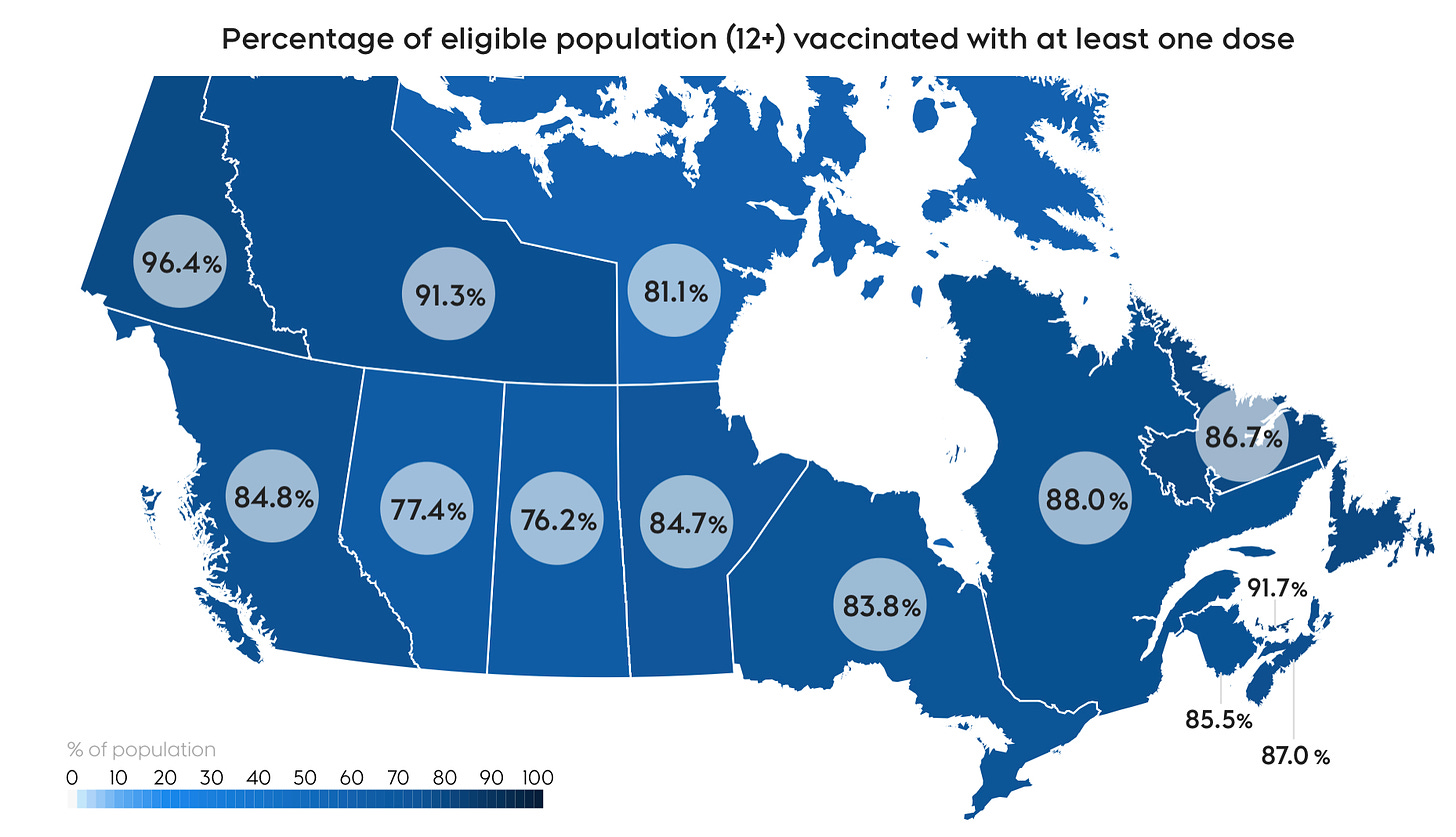🇩🇰
Good news on the pandemic front in Denmark. After two weeks at 0.9 Denmark’s Health Minister Magnus Heunicke says the COVID contact number (reinfection rate or R0) has fallen to 0.7. Heunicke says we now have a declining epidemic situation. He credits the vaccination effort and for people taking basic precautions to minimize coronavirus risk.
-
Denmark’s Staten Serum Institut says the Delta variant is causing increasing numbers of breakthrough infections among people who are fully vaccinated. In a report the agency found since the vaccination campaign began in December 27, there have been 10,866 infections among people who have had both vaccine doses. Of those, 9,253 infections were among fully vaccinated people when at least two weeks had passed since their second dose, when the vaccine had reached full strength.
Breakthrough infections among those who are fully vaccinated make up just 0.23% of the population who have had both doses.
The SSI found that 61% of all breakthrough infections have been as a result of the Delta variant. Agency Director Henrik Ullum says the variant continues to push up the number of infections among those who are fully vaccinated.
"Even if an immunity is built up already after the first vaccination, the response to the vaccine will not be strong enough or happen long enough to prevent infection for some people. Data, however, suggest that people with breakthrough infections are more likely to have milder symptoms than people who have not been vaccinated."
Among the breakthrough infections so far there have been 375 hospitalizations and 57 deaths. Deaths have by and large occurred among the oldest age groups.
-
On the vaccination front, numbers continue to slide, with 10,520 total inoculations done yesterday. Of those, just 1,611 were 1st doses.
So far, 75.5% of the total population has had one vaccine dose and 72.8% are fully vaccinated.
-
While the other four Danish health regions utilize pop-up vaccination sites in primary schools, universities, and colleges to reach younger people, that will not be the strategy in Region Syddanmark.
Executive Vice President Kurt Espersen spoke to DR Fyn:
“Most school-age children cannot consent to vaccination, and therefore must bring their parents with them. At the moment, it is our assessment that it would generally be easier for the parents just to take the children to a vaccination center.”
About one-third of the 12 to 15 year olds in Southern Denmark still need to get vaccinated.
-
Region Midtjylland says people needing a first or second dose in Ringkøbing will have to go to a different facility as of September 15. The old vaccination site at the ROFI center had to close down as indoor sports and activities resumed. The new place to get vaccinated will be at the Ringkøbing Health Center. After opening its doors on the 15th, the vaccination site will be open every Wednesday from 1:00pm to 5:00pm. People will be able to either book an appointment or drop-in to get their shot.
-
Denmark is reporting 451 COVID infections and two more coronavirus deaths in the last day.
Yesterday there were 103,739 total corona tests done, 43,694 PCR and 60,045 rapid, for a (PCR only) positivity percentage of 1.03%.
-
COVID hospitalizations (123) have slipped down (-2) while the number of infected people in an ICU (26) is unchanged day to day, and of those, the number on a ventilator (20) edged upward (+2).
-
Safe and effective. The Staten Serum Institut is dispelling some misinformation around the HPV vaccine administered to young women to prevent cervical cancer. A study involving 853,879 women from 10 to 29 years old found the HOV vaccine does not weaken the immune system against other infections. In fact, it found quite the opposite.
The SSI’s Professor Anders Hviid led the study:
"Fortunately, it does not appear that the HPV vaccine has a negative impact on the immune system's ability to fight other infections. We have investigated many different claims about side effects after the HPV vaccine. It has gradually become eleven studies of HPV vaccine safety. We have not found any cause for concern. There is no evidence that the vaccine is associated with serious and long-lasting side effects.”
The study poured over health information for more than 800,000 women over a nine-year period. They concluded the HPV vaccine did not increase the risk of hospitalization for any infection within 90 days of vaccination. On the contrary, the vaccinated women had fewer hospitalizations than expected.
The results have been published in the acclaimed scientific journal The Lancet.
🇸🇪
Sweden has added 2,924 infections and another seven virus deaths since its last update on Friday.
On COVID vaccinations:
Adult population 18 years old and older - 6,966,070 1st doses (81.6%) administered and 5,975,529 2nd doses (70%).
16 to 17 year olds - 194,717 1st doses done (55.4%) and 21,813 teens (6.2%) were fully vaccinated.
-
Sweden’s Public Health Agency (Folkhälsomyndigheten) says a number of COVID restrictions will be removed as of September 29. Stage 4 restrictions that will be lifted primarily involve restaurants, eateries, and the number of attendees at events.
Per Sweden’s five-phase plan to lift restrictions, these are the restrictions that will be rescinded as of September 29.
Participant limits for general gatherings and public events will be removed.
Participant limits for private gatherings in rented premises will be removed.
Rules governing the maximum number of individuals per party will be lifted for indoor venues serving food and drink.
Concerts will be permitted in indoor venues serving food and drink.
There is no date attached to the last phase, which will see all remaining restrictions be repealed.
Stage 5
Any remaining restrictions will be removed, including rules to prevent crowding in shopping venues and for cultural and leisure activities.
The Public Health Agency of Sweden will remove general guidelines on avoiding crowds, working from home when possible and thorough hand hygiene measures.
-
About 7,000 vaccine doses are at risk of being thrown in the garbage in Sweden. As vaccination numbers drop, the lack of demand has caused Doktor 24 to warn thousands of vaccine doses that are ready to be used are fast approaching their best-before date. Doktor 24 is a healthcare company involved in the Swedish vaccination effort.
Doktor 24’s Sara Dannborg spoke to TT:
“Right now it is an emergency situation in Malmö. Next week, 2,000 doses will reach their best-before date there, as it looks right now with the current booking rate.”
It is much the same situation in Stockholm.
“There are 2,000–4,000 doses and they are within two weeks of reaching their best before date. There has been declining demand for some time in Malmö in the 16–40 years old age group, and it is the same in Stockholm. It is a group that has low vaccination coverage compared to all other age groups.”
The company has opened up drop-in vaccinations to administer shots without having to book an appointment to try and bolster interest, but so far it has not worked.
-
Region Stockholm says COVID hospitalizations continue to rise in Sweden’s capital region. There are 114 people in hospitals across the region, an increase of 15 from the week before. In the last seven days 2,132 new coronavirus cases have been confirmed and two more people have died.
Infection Control Doctor Maria Rotzén Östlund is urging people to get vaccinated, especially with restrictions set to be lifted in a few weeks.
“We all want to return to a more normal life. The precondition for the restrictions now being proposed to be lifted is that vaccination coverage is at relatively high levels. However, there are still many who are not vaccinated, and it is therefore extremely important that they take the offer and get vaccinated. It is also important to remember that the restrictions are not expected to be lifted until three weeks from now. We all have a great responsibility to follow them until then.”
🇳🇴
Norway has seen 1,275 infections and one more corona death since yesterday’s update.
COVID hospitalizations (103) have jumped (+9) and the number of infected people in an ICU (32) is down (-2) and of those, the number on a ventilator (13) has also inched downward (-1).
So far, 72.65% of Norwegians have had one vaccine dose and 61.47% have had both.
-
Being fully vaccinated provides strong protection against serious cases of COVID, hospitalization, and death, according to not one but two new studies from Norway. The Norwegian Institute for Public Health says the two studies found vaccines offered very high protection against infection for all but the Delta variant. Maximum protection against the now dominant coronavirus strain is only achieved after two doses.
One study focused on the protection vaccines offered against infection, including the two latest variants of concern, Alpha and Delta. The second focused on hospitalization rates between vaccinated and unvaccinated populations.
Among Norway’s adult population, those 18 years old and older, almost 90% have one vaccine dose and 77% have two. One study found among people with one dose, 22% managed to evade infections, compared to 65% among the fully vaccinated. If you isolate it to just the Alpha variant, the rates were 55% and 84% respectively. The study determined getting as many people as possible two vaccine doses offered the highest protection, especially against the Delta variant.
NIPH Director Geir Bukholm:
“We have high vaccination coverage in Norway, which is a prerequisite for being able to succeed in having the lowest possible disease burden in the population and to avoid congestion in hospitals. Norwegian data confirm that vaccinated people have a much lower risk of serious illness than unvaccinated people, and clearly shows the positive effect that the vaccination program has on the course of the pandemic in Norway.”
The study that focused on hospitalizations found the chance of ending up in a hospital due to the coronavirus was more than 70% lower for people with one or both vaccine doses than for those who are unvaccinated.
The Norwegian study also had findings that directly contradicted two other studies out of Scotland and England. In Norway, researchers found the Delta variant does not increase the risk of hospitalization compared to the Alpha variant, which causes a sharp increase in hospital admissions in Norway and around the world. The two studies out of the United Kingdom concluded the exact opposite, that the Delta variant does increase the risk of hospitalization.
🇫🇮
Finland has registered 544 infections since yesterday’s update.
It will update fatality and hospitalization stats tomorrow.
To date, 4,054,262 1st vaccine doses (72.4% of the population) have been administered while 2,976,496 people (53.3%) have been fully vaccinated.
-
Finland’s new hybrid COVID strategy is under fire. The new plan was officially unveiled yesterday afternoon and this morning the Helsinki and Uusimaa Hospital District's Chief Physician Asko Järvinen did an interview on the YLE TV1 breakfast show and called the strategy “confusing.”
Järvinen told YLE there needs to be clearer guidelines:
“There were no concrete decisions on what to do and how to act. Practical measures were not given, and the recommendations of experts and calls for urgent action were ignored. At the same time, more responsibilities were placed on the regions, but the testing strategy and the operations of schools, how to respond if cases are found in schools, remains open. The experts have been communicating this to the ministry for a long time and have been growing increasingly concerned.”
He added part of the new strategy also seemed to directly contradict the government’s own recent messaging.
The new strategy moves responsibility for restrictions to combat the coronavirus to the different Finnish regional governments. It also relies less on testing, contact tracing, and isolation and instead focuses more on vaccination and the pending use of vaccine passports. Finnish Prime Minister Sanna Marin has said once 80% of the eligible population has been vaccinated then all restrictions will be removed.
-
A survey from the Finnish Institute for Health found that the pandemic has disproportionately impacted people who have recently migrated to Finland. Finnish newcomers reported increasing loneliness, and a loss of hope for the future, difficulty sleeping, poorer health, and quality of life in rates significantly higher than the general population. Nearly a quarter said the epidemic had seriously impacted their finances, compared to the same complaint from just 6% of the general population.
Research Manager Natalia Skogberg:
“This is a worrying observation, given that the economic situation of migrants has often been worse than average for the entire population, even before the corona epidemic. Difficult experiences often accumulate for people who are already in a weaker social position.”
The study also found that about 15% of those who recently immigrated to Finland experienced more discrimination during the pandemic. A significant proportion said they were suffering discrimination on a weekly basis.
The study also found some recent arrivals felt the opposite: that the pandemic had forged stronger friendships, made them feel more hopeful, and had improved their lives.
“This can be a sign of resilience in crisis situations. Those who have experienced crisis situations in the past may feel more strongly that this will also be overcome.”
🇩🇪
Germany is adjusting how it measures the severity of future COVID infection waves. Legislation passed in Germany’s lower house today seeks to move the focus off of infections and instead hospitalization numbers will be the main metric in determining how bad a COVID wave is hitting the country. The government feels with 61% of the population now fully vaccinated, infection numbers are no longer a reliable measurement. Other than hospital admissions, the legislation seeks to also factor in new infections per 100,000 inhabitants over a seven-day period, ICU capacity, and vaccination numbers.
German Health Minister Jens Spahn continues to ring the alarm over vaccination rates he considers much too low. He says the country is seeing a “growing pandemic of the unvaccinated” as he calls on people to go get vaccinated. Spahn is worried not enough people will be fully dosed by the colder fall months when infections are expected to rise again.
Germany reported 9,276 new infections and 47 more corona deaths today as it continues to see numbers push upward.
🇮🇹
The COVID pandemic reduced the average life expectancy in Italy in some of the hardest-hit regions by as much as four years. Overall, nationally, life expectancy dropped by 1.2 years in Italy.
A report today from The Local Italy cited the Italian national statistics office in revealing the pandemic reduced average life expectancy from 83.2 years old in 2019 down to 82 years old in 2020.
In the hardest hit areas of Bergamo and Cremona, men lost over four years off of their life expectancy and women lost around three years.
Italy, which once boasted the longest life expectancy in Europe, has lost almost 130,000 lives to the coronavirus pandemic.
🇪🇺
The COVID situation across Europe is characterized as stable, according to the latest weekly assessment by the European Centre for Disease Prevention. The agency says infections are still high but have stabilized. It says coronavirus cases are now decreasing slowly across all age groups except for children 15 years old and younger, where infections are clearly increasing.
While infections overall have been stable for four weeks running, COVID deaths have been slowly rising over the same period. The ECDC is forecasting that both fatalities and hospitalizations will continue to increase over the next few weeks before leveling off.
Keep in mind this is a general assessment of Europe as a whole and there are variations among the individual countries.
The ECDC assesses three countries in the EU as a high COVID concern. They are Bulgaria, Estonia, and Lithuania. 18 countries, including Germany, Ireland, the Netherlands, Norway, and Sweden, are considered a moderate COVID risk. Six countries, including Denmark and Finland, are rated as a low concern.
According to the ECDC, 75.9,% of Europe’s adult population (18 years old and older) have one vaccine dose and 67.7% have had both vaccine doses.
In Europe, the Delta variant is king. The European Centre for Disease Prevention says across the EU, the variant accounted for 99.3% of all infection cases. The Alpha variant was found in 0.3% of infections. Per ECDC “No other variant was detected above a level of 1% in any country.”
🇨🇦
Public Health Canada has still not updated its COVID dashboard since September 3rd.
While we wait, Worldometers is reporting that over the last three days there have been 4,882 infections and 16 deaths in Canada over the last three days. This number will also be off because B.C, Alberta, and some other provinces and territories haven’t reported since Friday. Yesterday, Ontario didn’t update its numbers either.
-
So far, the Canadian vaccination campaign has administered 28,154,246 1st vaccine doses (73.95% of the total population) while 25,738,513 people (67.60%) are now fully vaccinated.
In Ontario today, there were 1,145 infections over the last 48 hours; of those 891 were among people who were unvaccinated or who had one dose. There are 295 people in hospital and 192 in an ICU. 83.7% of the population 12 years old and older have one vaccine dose and 77.2% are fully vaccinated.
Quebec reported 515 infections and no new deaths today.
In Atlantic Canada, Newfoundland and Labrador has five new infections as it announces vaccine passports are coming. New Brunswick is reporting 54 infections and one more death over the last three days. Nova Scotia had 29 corona cases over the long weekend.
Manitoba saw 159 new infections and another six deaths over the last four days.
Saskatchewan has yet to report.
B.C. and Alberta will report at least three days of COVID infection data later today.




